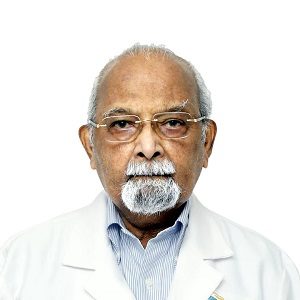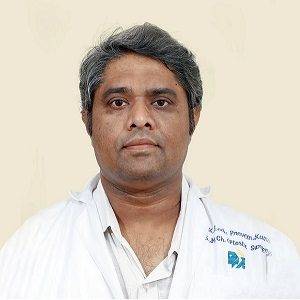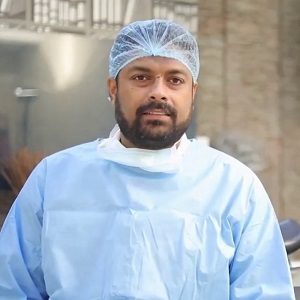Best Doctors in India for Alcoholic Hepatitis Treatment
- Endocrinologist and Diabetologist, Chennai, India
- Over 16 years’ experience
- Apollo Hospitals Greams Road, Apollo Sugar Clinics Greams Road
Profile Highlights:
- Dr. Narayanan N K is a well-respected endocrinologist in Chennai, having practiced for more than 16 years.
- Dr. Narayanan received the best abstract prize for his research on non-invasive lateralization tactics in the treatment of primary hyperaldosteronism. His poster presentation on Familial adrenocortical carcinoma has awarded as the best at the BES conference.
- Several of Dr. Narayanan’s research works have appeared in peer-reviewed journals published domestically and abroad.
- Dermatologist, Chennai, India
- Over 14 years’ experience
- Apollo Hospitals Greams Road
Profile Highlights:
- Dr. Shraddha M is one of the promising dermatologists in Chennai with nearly 14 years of dedicated experience in the field.
- Some of the services by Dr. Shraddha M include Laser Therapy, Chemical Peel, Acne Treatment, Hair Loss Treatment, Thread lift, Derma rollers, etc.
- She also had been Assistant Professor at Chettinad Hospital. Dr. Shraddha presented 9 papers in national and international journals.
- Plastic Surgeon and Cosmetic Surgeon, Chennai, India
- Over 22 years’ experience
- Apollo Hospitals Greams Road
Profile Highlights:
- Dr. Antony Aravind is a plastic surgeon in Chennai with an expertise of 22 years in managing cosmetic procedures.
- With his rich experience, Dr. Antony deals with the Reconstructive procedures related to deformities and blemishes. Some of the best services offered include lip enhancement, nose correction, breast augmentation, dermabrasion, etc.
- The British Association of Plastic Surgery has awarded Dr. Aravind Certification in Plastic Surgery.
- Dermatologist, Chennai, India
- Over 57 years’ experience
- Apollo Hospitals Greams Road
Profile Highlights:
- Dr. Col Rajagopal A is a senior dermatologist in Chennai, working for 57 years, and is qualified by the American Board of Dermatology.
- He is one of the IADU & L Academy’s teachers of excellence and has received a certificate of recognition.
- Dr. Rajagopal does Body Sculpting, Tummy Tucks, and Breast Augmentation on his patients.
- Dentist, Chennai, India
- Over 8 years’ experience
- Apollo Hospitals Greams Road
Profile Highlights:
- Dr. Fayeza Zaynab Quraishi is a young dentist in Chennai. Having worked in the field for more than eight years now, she is one of the best in the field of Dental Anti-Microbial Therapy, Dental Bone Grafting, and Dental Anti-Microbial Therapy.
- Patients visit her for Dental Crowns – Dental Cap, Anxious Patients Treating, Bad Breath Management, Apicoectomy, Ceramic Braces, Cavity Detection, and Conscious Sedation.
- Plastic Surgeon and Cosmetic Surgeon, Chennai, India
- Over 14 years’ experience
- Apollo Hospitals Greams Road
Profile Highlights:
- Dr. Kannan Prema is a bright young cosmetic surgeon in Chennai, working on aesthetics.
- With over 14 years of experience as a board-certified cosmetic surgeon, Dr. Kannan Prema is the ideal choice.
- She provides surgical treatments like breast reduction, Rhinoplasty, removal of skin tags, buttock liposuction, etc.
- Plastic Surgeon and Cosmetic Surgeon, Chennai, India
- Over 16 years’ experience
- Apollo Hospitals Greams Road
Profile Highlights:
- Dr. Kumaresan M N is one of the finest Cosmetic Surgeons in Chennai with nearly 16 years of experience in the field.
- He ensures the best aesthetics for his patients.
- The Tamil Nadu Medical Council has had him as a member since 1992.
- Plastic Surgeon and Cosmetic Surgeon, Chennai, India
- Over 22 years’ experience
- Apollo Hospitals Greams Road
Profile Highlights:
- Dr. Leela Praveen Kumar is one of the top Plastic Surgeons in Chennai with more than 22 years of dedicated experience.
- The doctor is frequently visited by the patients for Breast implants, Vaser Liposuction, rhinoplasty, facelift, Breast Reduction, Bariatric Surgery, Microsurgery, Body contouring, Hand surgery, and Onco Reconstruction.
- Dr. Leela Praveen Kumar also manages a non-Surgical fat reduction procedure, known as Cryolipolysis.
- Dentist, Chennai, India
- Over 14 years’ experience
- Apollo Hospitals Greams Road
Profile Highlights:
- Dr. Sanketh Reddy, one of the best young dentists in Chennai, is now a dental surgeon at Apollo Hospitals Chennai. He has more than 14 years of experience in the dental profession.
- As a result of his interest in Maxillofacial Prosthetics, Dr. Sanketh Reddy proceeded for his second Master’s degree from Mahidol University in Thailand.
- He also went through several diplomas and training to get a broad understanding of cutting-edge knowledge.
- Plastic Surgeon and Cosmetic Surgeon, Chennai, India
- Over 40 years’ experience
- Apollo Hospitals Greams Road
Profile Highlights:
- Dr. Sundararajan M S is one of the best Plastic Surgeons in India, having practiced for more than 40 years.
- The doctor offers lipo filling, body contouring, non-Surgical facelift, tummy tuck, implants, etc.
- Dr. Sundarajan bagged the Best paper award in 2008 & 2013 and the other Gold Medal for his contribution to the field.
Best Hospitals in India for Alcoholic Hepatitis Treatment
ALCOHOLIC HEPATITIS
Alcoholic hepatitis is a liver infection, which is mainly caused by frequent, heavy use of alcohol. Fat can build up in the liver cells, which might lead to inflammation as well as scarring of the liver.
Alcoholic hepatitis might be mild or severe. A patient might even need a liver transplant if proper treatment is not provided, or if they don’t stop consumption of alcohol.
It is also notable that all heavy drinkers don’t develop this condition, and sometimes this condition even develops in people who drink moderately. However, if you are diagnosed with this condition, it is important for you to quit drinking alcohol. People who continue drinking alcohol might face a huge risk of serious liver damage as well as death.
Symptoms
Depending on the amount of damage to the liver, the symptoms can vary. If you are having a mild form of the disease, you might not even experience any symptoms at all. However, as the damage continues to grow, you might experience the following:
- Changes in appetite
- Dry mouth
- Weight loss
- Pain or swelling in the abdomen
- Jaundice, or yellowing of the skin or eyes
- Fever
- Nausea and vomiting
- Easy bleeding or bruising
- Changes in your mental state, including confusion
- Fatigue
The symptoms of this condition are similar to those caused by a few other health conditions. Therefore, if you develop any of these symptoms, it is best to get a proper diagnosis as well as begin treatment.
Causes & risk factors
Alcoholic hepatitis generally develops when the alcohol you drink causes damage to your liver. However, it is not clear why alcohol does this damages only to some heavy drinkers.
Few factors that are known to play a role in this condition include:
- The body’s process that breaks down alcohol produces some toxic chemicals
- These chemicals can trigger inflammation that can destroy the liver cells
- Thus, over time, scars replace healthy liver tissue, thus interfering with the function of the liver
- This irreversible scarring, which is also termed cirrhosis, is the final stage of alcoholic liver disease
If you have hepatitis C and continue to drink, even moderately, you are more likely to develop cirrhosis.
Some heavy drinkers are also malnourished because they don’t eat a proper balanced diet. Alcohol and its byproducts also prevent the body from absorbing nutrition properly. Lack of nutrition can contribute to liver cell damage.
Some other risk factors that can lead to this condition include:
- Your sex- Women are usually at a higher risk of developing alcoholic hepatitis since the way alcohol is processed in women is different.
- Binge drinking- Having over five drinks within two hours for men and four or more for women can increase the risk of alcoholic hepatitis.
- Obesity- Heavy drinkers who are overweight are also more likely to develop alcoholic hepatitis and to progress from that condition to cirrhosis.
- Race and ethnicity- Hispanic and Negroid people might be at higher risk of alcoholic hepatitis.
- Genetic factors- According to studies, there may be a genetic component in alcohol-induced liver disease. However, it is difficult to separate genetic and environmental factors.
Diagnosis
If you are showing symptoms of alcoholic hepatitis, your doctor will first inquire about your medical history and alcohol consumption. Next, he/she will perform a physical exam to see if you have an enlarged liver or spleen. They might also need a few more tests to confirm your diagnosis, such as:
- Complete blood count (CBC)
- Liver function test
- Ultrasound of the liver
- Abdominal CT scan
- Blood clotting tests
In some cases, a liver biopsy might also be needed to confirm the diagnosis of alcoholic hepatitis. A liver biopsy requires your doctor to remove a tissue sample from your liver, which is then tested in the lab. This method helps to show the severity and type of liver disease.
Treatment
Stopping alcohol consumption is the most important treatment for alcoholic hepatitis. There is no cure for this condition, but treatment can help in reducing or eliminating symptoms, or stopping its progression.
It is also important to note that scarring of the liver is permanent, but treatment can aim to restore as much function as possible.
Dietary changes
Medication
Liver transplant
The best hope of recovery is to be aware of the signs and symptoms as well as to reduce, manage, or if possible, completely stop consumption of alcohol.
Complications
Alcoholic hepatitis might lead to severe other complications such as:
- Enlarged veins (varices)- In this condition, blood that is unable to flow freely through the portal vein, can back up into other blood vessels in your esophagus or stomach.
- Hepatic encephalopathy- This condition can be caused by the buildup of toxins if your damaged liver is unable to remove all the toxins from your body. It involves confusion, drowsiness, and slurred speech.
- Ascites- Ascites is a condition in which the fluid that accumulates in the abdomen may get infected and thus, require treatment with antibiotics. Although this condition is not life-threatening, it can be a sign of advanced alcoholic hepatitis, or cirrhosis.
- Kidney failure- A damaged liver affects blood flow to the kidneys, thus resulting in kidney failure.
- Cirrhosis- The scarring of the liver might lead to liver failure.
Prevention
Alcoholic hepatitis might be prevented if you take the following steps:
- Drink alcohol in moderation, if at all- For healthy adults, moderate drinking means no more than one drink a day for women of all ages and men older than 65, and not over two drinks a day for men aged 65 and younger. However, if you prevent all alcohol, it is a certain way to prevent this condition.
- Check before mixing medications and alcohol- Ask your doctor if it’s safe to drink alcohol while you are taking medications. Consider reading the warning labels on over-the-counter medications as well. Don’t drink alcohol when you are taking medications that warn of complications when combined with alcohol.
- Protect yourself from hepatitis C- Hepatitis C is an infectious liver disease that is caused by a virus. If it is left untreated, it may lead to cirrhosis. If you are having hepatitis C and you consume alcohol, you’re generally more likely to develop cirrhosis than if you don’t drink.















